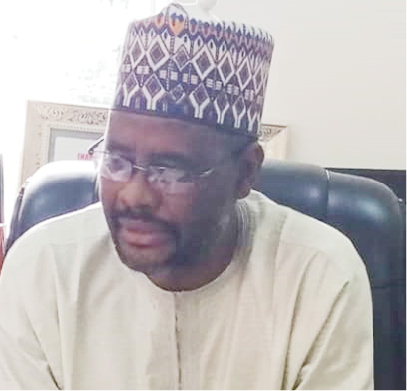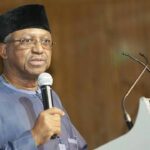Dr. Gambo Aliyu is the Director-General of the National Agency for the Control of AIDS (NACA).
In this interview, he speaks on approaches to knowing one’s HIV status, what to do after testing positive or negative, elimination of mother to child transmission of HIV, and meeting the country’s HIV funding needs among others
How is the country faring in the prevention of mother to child transmission of HIV?
Prevention of mother-to-child transmission (PMTCT) is one area that we recently began to restrategise because if you have been using a strategy of over 10 years and it’s not yielding much output, you need to look inward to see whether it is standing on sound footing.
We are looking forward to using primary health care centres to ensure that 50 percent of pregnant mothers that don’t come even to primary health cares within the community are reached via community resources that we have at our disposals.
We can do this by deploying individuals to their homes or to meet them at convenient for them to discuss and provide them services.
This way every pregnant woman where ever she lives would have a HIV rest during pregnancy which is very important.
Several societies now globally are already eliminating mother to child transmission.
A woman may be test negative during a pregnancy and in the next pregnancy test positive. Mothers need to understand that the safest way of preventing their children from living with HIV starts with them.
If you know that you are negative throughout your pregnancy, you don’t have to worry about your baby getting infected. However, if you are positive, it is the time to work closely with places where HIV treatment is given, for adequate preventive measures for your child.
With the support of all, we can also join the countries that have eliminated mother to child transmission.
What are you doing to ensure Nigeria achieves UNAIDS 95-95-95 target ?
There are two targets; there is the 90-90-90 which we are yet to reach and there is the 95-95-95 .
We will first reach the 90-90-90 and then move to 95-95-95 and hopefully after reaching that you have firm control of the epidemic. This 90-90-90 target simply means 90percent or 9 out of 10 people that have HIV in the country know they have HIV and get another 90 percent of those who know they have HIV to be on treatment, and that 90 percent on treatment have these treatments working in them, which means success against the virus.
By the time you achieve the triple 90, you have 73 percent of the people that know they have HIV in the community.
This ensures that the virus doesn’t affect other people and this is can be further achieved by the use of HIV drugs which are free and available in all our centres.
Our plea to the public is that people should help themselves and others by knowing their HIV status.
You can simply buy HIV self-testing kits. You don’t need your blood you only need your saliva. Just seat in the comfort of your room, read how the test is done and do it.
If the test is negative, you can simply come to us or call our line 6222 for us to tell you what you need to do to remain negative for the rest of your life.
However, if the reverse is the case, we want people to know that is not the end of the road but the beginning of another journey. Call our centre to get help on the needed information as regards proper medication and transmission prevention.
How has the Nigeria AIDS Indicator and Impact Survey (NAIIS) helped the country’s HIV response ?
Since 2018 when the study was done, and the data was launched, whatever we use in terms of budget, estimation of our planning as well as the number we need to identify all came from NAIIS.
Before NAIIS, we were talking about 3.5 million people living with HIV in the country, but after NAIIS, we found out that Nigeria has less than two million.
So far we have identified 1.2 million on treatment which leaves us with a gap of 500 to 600 000 people more to be identified for us to feel satisfied that we have reached the triple 95.
What are your sustainability plans for HIV response in Nigeria?
We realise the amount of resources needed for Nigeria to own or fund its HIV response is enormous. Government alone will find it very difficult to do, so we are reaching out to the private sector to establish an initiative called HIV Trust Fund .
The US government through PEPFAR supports 85% of our response , Global Fund supports 10%, while the government of Nigeria and private sector provide 5%. So the fund will help lift the heavy burden off the government for domestic funding and ownership.
With over a million on our treatment list, if the donor funding that comes from US government and Global Funds seizes to flow, Nigeria will have a minimum of one million people on treatment for the domestic resources.
This is enormous at the rate of N50 000 per person per year. The way we treat HIV now using direct procurement, it will require N50 billion to treat one million HIV positive individuals in one year.
The federal government promised to place 100, 000 additional patients on treatment, what is the status of that pledge?
Because we lack resources, our funding partners requested that we show ownership and demonstrate our capacity to sustain the response after they have exited.
So President Buhari three years back, promised that from 2020, we are going to start adding 50 000 new patients on our treatment list from domestic resources which means Nigeria will be responsible to provide treatment to 100 thousand people from this year.
I want to assure the funding partners that Nigeria is on course to fulfill this pledge and we will ensure that the commodities like drugs needed to treat 100 000 and HIV testing kits needed to identify 50 0000 new individuals are provided.
We have already placed orders and these are from platforms that are verifiable for the funding parties, UN, civil society organisations and Nigerians can check and verify.

 Join Daily Trust WhatsApp Community For Quick Access To News and Happenings Around You.
Join Daily Trust WhatsApp Community For Quick Access To News and Happenings Around You.
